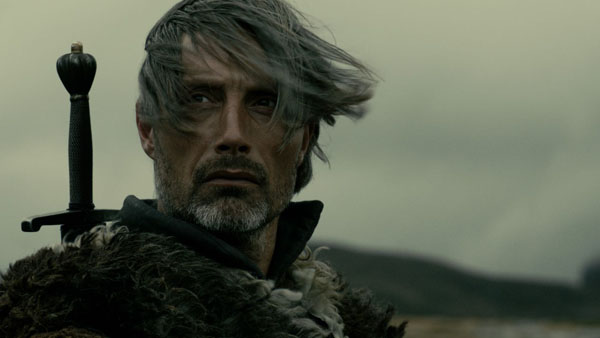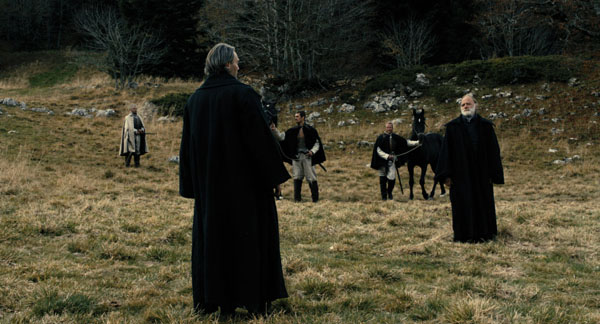“An old-fashioned, Robin Hood-style revenge tale that favors self-serious storytelling over action and suspense, Arnaud des Pallieres’s Michael Kohlhaas provides a few quick thrills and some beautifully photographed landscapes,” writes Jordan Mintzer in the Hollywood Reporter, “but never really convinces as an intellectual’s swords-and-horses period piece—even when it’s the formidable Mads Mikkelsen who’s holding the sword…. Based on Heinrich von Kleist’s novella, this is actually the second screen adaptation following a 1969 version by Volker Schlöndorff, which also played in competition at Cannes. The original text, written in 1811, was based on the true story of a 16th-century German merchant who, after a local baron seized his horses, sought redress in the public courts before launching a private terror war, until he was eventually captured and executed.”
“The film is a striking departure for hitherto-marginal French director des Pallières, best known for idiosyncratic documentaries and a bizarre, modernist John Cheever adaptation, Parc.” Jonathan Romney in Screen: “The sober, intense Michael Kohlhaas is closer in feel to the 1970s historical films of Werner Herzog, or to Roman Polanski’s Macbeth—with a dash of Sergio Leone in the equestrian action. And the film’s most idiosyncratic touch is a dark desolate atmosphere that registers as distinctly medieval, rather than 16th-century.”
Back to the Schlöndorff adaptation for a moment, because Variety‘s Jay Weissberg holds it up as an interesting contrast. Schlöndorff “added newsreel footage on the European release prints showing student protests around the world. The device served to make direct parallels between the novella’s themes and the unrest of ’68, highlighting the continued vitality of a tale featuring a morally upright figure resisting the corrupting influences of power. Kleist himself, a determinedly political author writing in 1808, used the based-on-fact case to draw comparisons with Napoleon’s thirst for dominance. Oddly, given the richness of the theme, helmer Pallieres seems more inspired by landscape than by history or any contemporary resemblances.”
Des Pallières’s version “has a slow contemplative quality in which every action is carefully considered, words are few, and little is seen of the violent deeds beyond sweat on men’s faces and trickles of blood gleaming in darkened rooms,” writes Barbara Scharres at RogerEbert.com. “Through nearly all of Michael Koolhaas, Mikkelson has been seen as alternately proud, passive, concerned, or worried, none of these emotions causing much of a ripple across his sharply chiseled face. In the final minutes, as he ascends a scaffold for his execution, his face is transformed by the successive emotions of a frightened and regretful man about to die. It’s a wonderful flash of what Michael Koolhaas might have been.”
The Guardian‘s Andrew Pulver notes that “des Pallières has a fine eye for the rough-hewn physicality of the period; the clanking metal of the weaponry, the squeaking wooden axles of the carts, the ragged homespun fabric of the clothing. He also comes up with some rather brilliantly staged sequences: a raid on a baronial fortress by Kolhaas and his crossbowmen; a curious visit by youthful princess Marguerite that catches hunky Mads in the bath; an intriguing scene where Kolhaas is criticized by a charismatic clergyman played by Denis Lavant. But for a story that seeks to remind us of the harshness of pre-modern life, the whole is very emotionally soft-focus.”
The festival’s posted a clip (1’43”).
And Variety‘s Elsa Keslassy reports that Music Box has picked up North American rights.
For BFI programmer Geoff Andrew, writing for Time Out London, “Arnaud de Pallieres’s film succeeds neither as a decent adaptation of the book nor as a rewarding movie in its own right. Transplanting the action from Germany to the Cevennes and almost exclusively using exterior locations was an unwise move, and though Pallieres has spoken of his desire to make a kind of western, the changes simply highlight the way he has stripped down the original narrative. This paring back only serves to make the precise legal and logistical details of Kohlhaas’s mission less comprehensible than in the novella.”
“One should never complain about too many closeups of Mikkelsen,” writes Wesley Morris at Grantland, “but a wide shot of something else would have been nice. Anyway, it’s just not a film you talk about the next day. It’s a film you don’t even remember you saw. And I just watched it an hour ago.”
Update, 5/27: Jessica Kiang at the Playlist: “[S]tacked with a ridiculously watchable cast, and encased in rich, atmospheric landscape photography, the great mystery is how Michael Kohlhaas, like an errant carthorse, manages to slip the tethers of our attention and interest and go plodding off into the hills, never to return: it’s handsome, stately and deathly dull.”
Cannes 2013 Index. And you can watch over 100 films that have seen their premieres in Cannes right here on Fandor. For news and tips throughout the day every day, follow @KeyframeDaily on Twitter and/or the RSS feed. Get Keyframe Daily in your inbox by signing in at fandor.com/daily.





